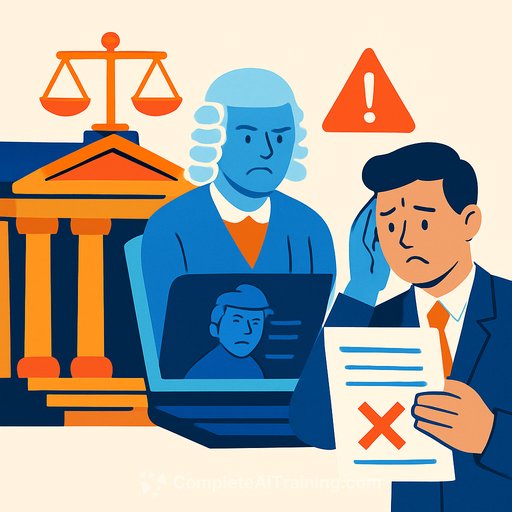Delhi HC Allows Withdrawal of Plea After AI-Generated, Non-Existent Citations Surface
In a first-of-its-kind incident for the Delhi High Court, a petition was withdrawn after respondents demonstrated that the plea relied on fabricated case law and quotes from judgments that do not exist. The Court noted the issue on record and permitted withdrawal at the petitioner's request.
Status: Dismissed as withdrawn
Published: 27 Sept 2025
Case snapshot
Case Title: GREENOPOLIS WELFARE ASSOCIATION (GWA) vs NARENDER SINGH AND ORS
Bench: Justice Girish Kathpalia
Hearing: 25 September 2025
Impugned orders: 18.09.2025, 20.09.2025, 22.09.2025 (trial court)
What went wrong
The petition by Greenopolis Welfare Association challenged trial court orders that restricted it from filing a written statement while allowing pleas by several homebuyers. During arguments, respondents produced a compilation showing that the petition cited false or non-existent authorities.
Examples included "Chitra Narain v. DDA, 2000 (87) DLT 276," which the respondents said does not exist. The petition also quoted paragraphs 73 and 74 of "Raj Narain v. Indira Nehru Gandhi, (1972) 3 SCC 850," although the judgment has only 27 paragraphs.
What the Court recorded
Upon being confronted, senior counsel for the petitioner sought permission to withdraw. The Court recorded: "Petitioner has assailed orders dated 18.09.2025, 20.09.2025 and 22.09.2025 of the learned trial court. However, after addressing partly, learned senior counsel for petitioner on instructions seeks permission to withdraw this petition."
On the non-existent citations, the Court noted: "All learned senior counsel and counsel appearing for respondents submit that they would take appropriate steps since some of the judicial precedents cited on behalf of petitioner do not even exist and in some of the precedents, the quoted portions do not exist. At the request of both sides, it is made clear that submissions advanced today were confined only to the impugned orders and nothing else."
Why this matters for legal teams
This is among the first known instances before the Delhi High Court where alleged "AI hallucination" entered the record. The message is clear: AI outputs are not authorities, and any unverified citation can jeopardize a case, trigger adverse remarks, and invite cost or disciplinary exposure.
For chambers and in-house teams, the risk is operational and reputational. Strong cite-check protocols are now mandatory, especially where research tools or AI assistants are involved.
Practical safeguards for citation integrity
- Verify every case in primary sources: SCC Online, Manupatra, official High Court/Supreme Court websites, or reported reporters (DLT, SCC, AIR).
- Use "note up" features (e.g., SCC Online NoteUp, Manupatra Citegraph) to confirm validity, treatment, and paragraph ranges.
- Quote with precision: match paragraph numbers, neutral citations, bench strength, dates, and exact extracts.
- Attach key authorities to filings and maintain a research log showing source, query path, and verification timestamp.
- Treat AI tools as brainstorming aids only. Do not rely on AI-generated citations without independent confirmation.
- Adopt a firm policy: pre-filing citation audit by a second reviewer; random post-filing audits for quality control.
- Train teams on AI limitations and citation hygiene. For structured upskilling, see curated courses at Complete AI Training.
Counsel appearances
For Petitioner: Mr. Rakesh Tiku, Sr. Advocate with Mr. Gaurav Kohli and Mr. Ashish, Advocates.
For Respondents: Mr. N. Hariharan, Sr. Advocate with Mr. Ajay Sabharwal, Mr. Prateek Bhalla, Ms. Punya Rekha Angara, Mr. Aman Akhtar, Ms. Vasundhara N., Ms. Sana Singh, Ms. Vasundhara Raj Tyagi, Mr. Arjan Singh Mandla and Ms. Gauri Ramachandran, Advocates for R-1 to 15. Mr. N. Hariharan and Mr. Abhijat, Sr. Advocates with Mr. Ajay Sabharwal and Mr. Jai Sikand, Advocates for R1 (plaintiffs no. 1 to 4). Mr. Sanjoy, Sr. Advocate with Mr. Ajay Sabharwal, Mr. Jai Sikand and Mr. Anuj Aggarwal, Advocates for R1 (plaintiffs no. 5 to 19). Mr. Neeraj Dev Gaur, Advocate for R-1 (plaintiffs no. 20 & 21). Mr. Tushar Sannu and Ms. Shaoni Das, Advocates for R-21 & 22.
Access the order
The order can be accessed from the Delhi High Court website once uploaded: Delhi High Court.
Context from abroad
Courts elsewhere have sanctioned counsel for filing AI-generated fake citations, e.g., the SDNY order in Mata v. Avianca. For reference, see the public order: Mata v. Avianca (S.D.N.Y. June 22, 2023).
Bottom line
The petition was withdrawn after fabricated citations and non-existent quotes were flagged. Expect stricter scrutiny of authorities and a higher bar for verification in filings that draw on AI-assisted research.
Your membership also unlocks:






